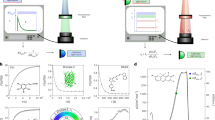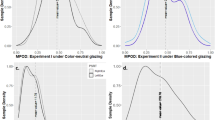Abstract
PROF. RAMAN has recently directed attention (NATURE, September 1, p. 12) to some observations by Brewster on what the latter called the “radiant spectrum ” (Phil. Mag., vol. 2, p. 202, 1867). Brewster advanced the hypothesis that the phenomenon was due to the granular surfaces of the eye rendering the ultra-violet rays visible by fluorescence. Prof. Raman proposes the alternative hypothesis that diffraction by the corneal corpuscles of the eye accounts for the phenomenon. Brewster's view is at variance with the fact that when a colour screen, opaque to ultraviolet rays, is placed in the optical path between the source, the prism, and the eye, it does not render the “radiant spectrum” appreciably less visible. Fluorescence set up by ultra-violet rays can therefore be safely excluded as a possible cause of the phenomenon. Prof. Raman's view that diffraction effects by the corneal corpuscles of the eye are responsible is at variance with the following facts:—
This is a preview of subscription content, access via your institution
Access options
Subscribe to this journal
Receive 51 print issues and online access
$199.00 per year
only $3.90 per issue
Buy this article
- Purchase on Springer Link
- Instant access to full article PDF
Prices may be subject to local taxes which are calculated during checkout
Similar content being viewed by others
Author information
Authors and Affiliations
Rights and permissions
About this article
Cite this article
HARTRIDGE, H. The Radiant Spectrum. Nature 108, 467–468 (1921). https://doi.org/10.1038/108467c0
Published:
Issue Date:
DOI: https://doi.org/10.1038/108467c0
Comments
By submitting a comment you agree to abide by our Terms and Community Guidelines. If you find something abusive or that does not comply with our terms or guidelines please flag it as inappropriate.



